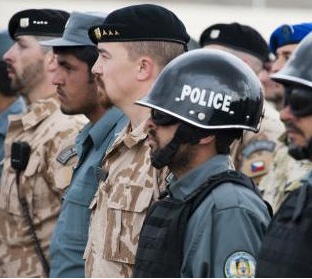
China’s Energy Security Dilemma
February 13, 2012
The Wukan Effect
February 24, 2012By Randall Schriver and Isabella Mroczkowski |
In June of last year President Obama announced that he would withdraw the 33,000 surge troops from Afghanistan by the end of this summer, setting in motion a series of timelines underscored by Secretary Panetta’s recent statement that the United States military would seek to end combat operations at some point next year. The pace and the scope of this withdrawal and end to the U.S. combat role has been a subject of intense debate. In contrast, experts across the ideological spectrum have agreed that developing the capacity, capability and competence of Afghan security forces is key for a successful transition and sustainable peace in Afghanistan.
Therefore, it is especially troubling to hear that the NATO Training Mission in Afghanistan (NTM-A), which is the military command responsible for training and advising Afghan security forces, may be targeted for deep cuts beginning in Fiscal Year 2013. By all accounts, the Afghan National Army (ANA) and Police (ANP) are not prepared to meet internal security challenges alone. Such a decision, if put into effect, would by all appearances be counter-intuitive.
As outlined in a recent Project 2049 Report entitled The Police Challenge: Advancing Afghan National Police Training , the mission has been difficult, the challenges numerous and the results mixed. However, the NATO training command, working with its Afghan partners, has demonstrated an ability to adapt and move forward making slow and steady progress in recent years. Given pressing budget demands, we must be careful not to be penny-wise and pound-foolish by unnecessarily putting these gains at risk.
In addition to providing an overview of the existing training methodologies and identifying areas of concern, the Project 2049 report contained a series of specific recommendations that highlighted the need to not only maintain current activities, but in fact to intensify and increase the overall training effort. In tracking training activities since the report was issued, the working group has noted that the command has tackled quantitative issues such as low recruitment numbers, but more importantly has also honed in on qualitative challenges related to institutional reforms and human capital.
While real progress has been made, there are still an insufficient number of mentors and trainers to meet the training requirements. In interviews with the Project 2049 Working Group, government officials consistently cited the presence of qualified mentors as a key factor in improving individual and unit level performance. Force or funding reductions in the training program would require eliminating existing mentor positions and further exacerbate the challenge of developing professional, capable and respected security forces.
Director of National Intelligence James Clapper in his January 31, 2012 testimony to the Senate Select Committee on Intelligence regarding the Worldwide Threat Assessment of the U.S. Intelligence Community noted: “ISAF partnering and mentoring have begun to show signs of sustainable progress at the tactical and ministerial levels; however, corruption as well as poor leadership and management will threaten Afghan National Security Force’s operational effectiveness.â€
As we debate the pace and shape of the drawdown we should agree that a robust training program of the Afghan forces must continue for several years beyond the currently discussed timelines. Furthermore, NATO will need to provide the necessary manpower and financial resources to sustain these activities.Well-trained and trusted security forces will reaffirm the legitimacy of the Afghan government and provide for the security and stability Afghanistan will need long after the combat role of international forces draws to a close.
Randall Schriver is CEO and President and Isabella Mroczkowski is a Research Assistant at the Project 2049 Institute




